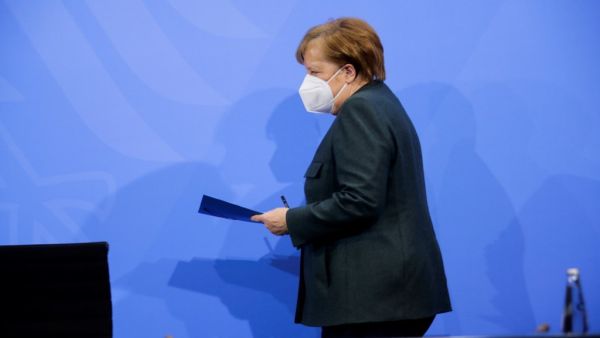Germany on Tuesday extended its coronavirus lockdown until Feb. 14 as Europe's biggest economy struggled to contain a second wave of infections.
Amid concerns over highly contagious mutations of the virus, Chancellor Angela Merkel and the prime ministers of the 16 federal states agreed on tougher measures despite slowly declining case numbers.
Speaking to reporters after her video conference with the premiers, Merkel said “the mutation of the coronavirus is causing concern.”
Angela Merkel and Germany's state leaders have agreed to extend the current #lockdown until February 14th.
— DW Politics (@dw_politics) January 19, 2021
Starting Thursday, further measures will also apply:
? medical masks required on public transport & in shops
? employers must allow staff to work from home if feasible pic.twitter.com/RLwSJRkuIZ
“The [mutated] virus has already been detected in Germany,” she said, but according to scientists, it is not yet dominant.
"We have to act now. That moved me and us during the deliberations. Now is the time to brace for the danger," Merkel added.
She stressed that if the number of infections is low, the mutated virus has little chance of asserting itself.
The chancellor made wearing medical masks mandatory on public transport and companies are required to ask all employees who can work from home to do so, unless this is impossible.
Under the new regulation, people are barred from wearing homemade cloth masks or scarves as face coverings in shops and on public trains and buses, instead mandating the use of “clinical masks” including single-use surgical masks as well as filtering facepiece respirators, commonly known as FFP2 masks.
According to the decisions taken in the meeting, schools, daycares and all non-essential shops will remain closed nationwide until at least Feb. 14.
The eight-hour online crisis talks between Merkel and the state premiers were brought forward by a week because of the virus variants.
JUST IN: Germany extends coronavirus lockdown until the 14th of February
— The Spectator Index (@spectatorindex) January 19, 2021
Germany handled the first wave of the coronavirus pandemic relatively well, but a second wave struck Europe's economic powerhouse hard.
New infections have surged way above the 50 per 100,000 people incidence rate threshold marked by the government.
This article has been adapted from its original source.








